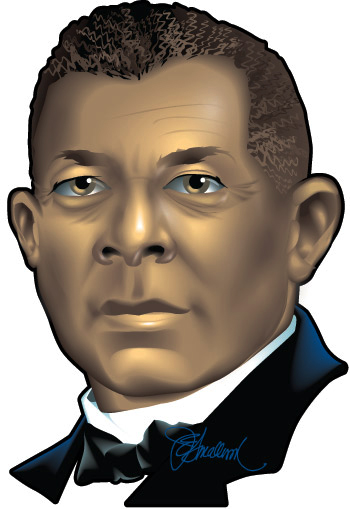
“Associate yourself with people of good quality, for it is better to be alone than in bad company.” |
|
|
 Booker T. Washington Booker T. Washington
(1856-1915) — Educator, author, orator, adviser to several U.S. presidents
By The Staff
He was perhaps the most powerful African- American in the country after his 1895 speech, the Atlanta Exposition Address, brought him national attention. His supporters included rich liberal Northern whites, black preachers, educators, businessmen, and many in the black community. An orator, author, educator, and presidential adviser, Booker T. Washington was a towering figure in the world of black politics.
Washington leveraged his access to wealthy philanthropists and national leaders to gain cooperation and financial support for his agenda.
Up from slavery
Washington was born on April 5, 1856, in Franklin County, Virginia. His mother, Jane, was a plantation cook. His father was an unidentified white man. Once, while working on the plantation, he happened upon a schoolhouse. Peering inside, he saw children his age reading from books. He wanted to learn what those children were learning; however, it was illegal for slaves to be taught to read and to write.
Jane, who noticed Washington’s interest in learning to read, acquired a book, and he learned the basics of the alphabet and how to read and write a few words.
At age 16, Washington left home. He walked more than 450 miles to Hampton Normal Agricultural Institute in Virginia. He supported himself by doing odd jobs. Once at the school, he persuaded school officials to let him enroll while he worked as a janitor to pay his tuition. Because of his work ethic and dedication to his studies, he was noticed by the school’s founder, who offered Washington a scholarship. He graduated from Hampton in 1875 and after teaching at several schools, he began teaching at Hampton.
In 1881, Washington was recommended to run a new school, the Tuskegee Normal and Industrial Institute in Alabama. He helped Tuskegee become a leading school in the nation. Washington taught that economic success would take time and that subordination to whites was needed until African-Americans proved they merited full economic and political rights.
Washington was criticized after revealing his thoughts on race relations publicly in 1895 in a speech at the Cotton States and International Exposition in Atlanta, Georgia, known as the “Atlanta Compromise.” In his speech, Washington stated that African-Americans should accept disenfranchisement and social segregation as long as whites allowed them economic progress, educational opportunity and justice in the courts. Activists such as W.E.B. Du Bois assailed  Washington for not demanding equality for black Americans. Washington for not demanding equality for black Americans.
The founder of Tuskegee Institute, now known as Tuskegee University, died on Nov. 14, 1915, at age 59.
|











